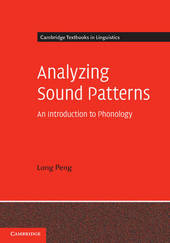
|
Analyzing Sound Patterns: An Introduction to Phonology
Paperback / softback
Main Details
| Title |
Analyzing Sound Patterns: An Introduction to Phonology
|
| Authors and Contributors |
By (author) Long Peng
|
| Series | Cambridge Textbooks in Linguistics |
|---|
| Physical Properties |
| Format:Paperback / softback | | Pages:585 | | Dimensions(mm): Height 244,Width 173 |
|
| Category/Genre | Phonetics and phonology |
|---|
| ISBN/Barcode |
9780521147408
|
| Classifications | Dewey:414 |
|---|
| Audience | | Tertiary Education (US: College) | | Professional & Vocational | |
|---|
| Illustrations |
Worked examples or Exercises; 10 Tables, black and white; 168 Line drawings, unspecified
|
|
Publishing Details |
| Publisher |
Cambridge University Press
|
| Imprint |
Cambridge University Press
|
| Publication Date |
8 August 2013 |
| Publication Country |
United Kingdom
|
Description
Analyzing Sound Patterns is a clear and concise introduction to phonological phenomena, covering a wide range of issues from segmental to suprasegmental problems and prosodic morphology. Assuming no prior knowledge of problem solving, this textbook shows students how to analyze phonological problems with a focus on practical tools, methodology and step-by-step instructions. It is aimed at undergraduate and beginning graduate students and places an instructional focus on developing students' analytical abilities. It includes extensive exercises of various types which engage students in reading and evaluating competing analyses, and involves students in a variety of analytical tasks. This textbook: * is designed around related phonological problems and demonstrates how they are analyzed step by step * presents and compares competing accounts of identical problems, and discusses and evaluates the arguments that distinguish one analysis from another * details how a broad array of sound patterns are identified and analyzed.
Reviews'A lively text that develops analytical skills through exposure to a wide array of data. Carefully constructed exercises range from multiple choice to open-ended essay questions.' Ellen Broselow, Stony Brook University
|